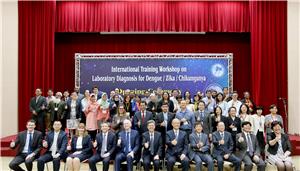US and Taiwan co-organize International Training Workshop on Laboratory Diagnosis for Dengue/Zika/Chikungunya to strengthen diagnostic capacity for mosquito-borne diseases among South and Southeast Asian countries and share regional epidemic control resources

In light of the continuing threat posed by dengue fever, Zika, and chikungunya and the fact that they are all transmitted through mosquitoes and share similar symptoms, the U.S. and Taiwan have co-organized the four-day International Training Workshop on Laboratory Diagnosis for Dengue/Zika/Chikungunya that starts on April 25, 2017 in the hope to improve the diagnostic capacity for mosquito-borne diseases among 18 countries, including South and Southeast Asian nations. Several distinguished guests, including the Vice President Chen Jien-ren (陳建仁), the Minister without Portfolio Deng Chen-chung (鄧振中), the Minister of Health and Welfare Chen Shih-chung (陳時中), the Vice Minister of Foreign Affairs Leo Chen-jan Lee (李澄然), the Chairman of the Board of Trustees of the American Institute in Taiwan (AIT) James Moriarty, the Director of the American Institute in Taiwan (AIT) Kin Moy, and representatives from countries, including Singapore, Indonesia and Australia, were also in attendance.
This workshop is held under the US-Taiwan Global Cooperation Training Framework (GCTF) and this is the first time the Taiwan Centers for Disease Control (Taiwan CDC) is sharing the self-developed three-in-one laboratory test for Zika, dengue and chikungunya, which consists of the multiplex PCR assay targeting dengue, Zika, and chikungunya viruses and the multiplex platforms of molecular and serological assays for a broader spectrum of arbovirus detection, with senior laboratory professionals from countries in Asia and the Caribbean. The workshop aims to assist South and Southeast Asian nations establish the capability to detect and differentiate dengue fever, chikungunya and Zika within one work day, effectively preventing the transmission of infectious diseases and ensuring the health and wellbeing of the people.
35 laboratory professionals from 18 countries, including Australia, Bangladesh, Cambodia, Haiti, India, Indonesia, Japan, Malaysia, Myanmar, Nepal, New Zealand, Papua New Guinea, the Philippines, Singapore, Sri Lanka, Thailand, and Vietnam, are participating in this workshop. Experts from the U.S. Armed Forces Research Institute of Medical Sciences (AFRIMS) and Japan’s National Institute of Infectious Diseases (NIID) are attending the workshop as the lecturers to help refine the diagnostic capacity for arboviruses, effectively improve the regional capacity to tackle infectious diseases, reinforce global health security, and ward off the threats posed by infectious diseases.

